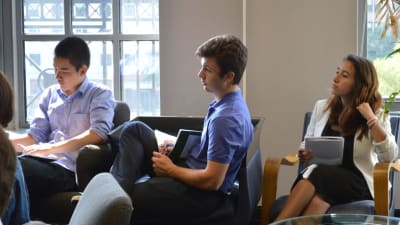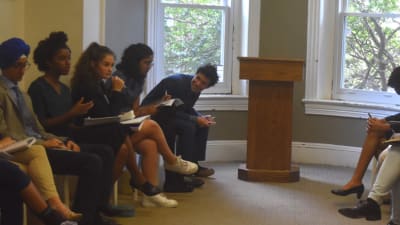Legendary Speechwriter Lissa Muscatine leads SEGL Master Class
The “Master Class” is an SEGL signature experience: several times a semester, our students present and defend a “deliverable” in front of a distinguished guest expert. The deliverable might be a policy memo, an ethical argument, or–as was the case last week–a three minute speech.
Lissa Muscatine, who was Hillary Clinton’s top speechwriter for nearly twenty years (and who also wrote speeches for President Bill Clinton), is one of SEGL’s favorite Master Class teachers. Almost always accompanied by Megan Rooney, who currently writes speeches at the White House for President Obama and others, Muscatine is adept at preparing our students to write convincing speeches. And she critiques those speeches with a collegial incisiveness that leaves students impressed and ready to revise.
On Monday morning, Muscatine joined us for a 90-minute opening session, in which she told several speechwriting war stories (What was it like to author Hillary Clinton’s now-legendary 1995 “Women’s Rights are Human Rights” speech in Beijing? What was it like to write Clinton’s 2008 Democratic National Convention speech?), gave a list of speechwriting “do’s and don’t’s” (DO know your audience; DON’T use adjectives and adverbs!), and answered student questions about her career, about the Clintons, and about speechwriting.
Muscatine also handed out a challenging speechwriting assignment (click on the link to see it!) involving the imaginary release of an ISIS recruitment video that had been leaked to be press. To research the ethical dimensions of the assignment, the students on Wednesday paid a visit to the DC headquarters of The New York Times, where they met with Pulitzer Prize-winning journalist Eric Schmitt (click on the link to read a brief bio and dozens of front-page articles that Schmitt has written in the past few months). Among other distinctions, Schmitt was the Times‘ main contact for WikiLeaks founder Julian Assange, so Schmitt has ample experience wrestling with the ethical issues our case study raised. The students heard several intense stories and gained insight into many of the ethical nuances that journalists face.
After breaking into groups of four for days of speechwriting debate and collaboration, each team presented its speech to Muscatine and Rooney on Friday morning. One by one, six students presented speeches, which were then shown on the flat-screen television that sits behind our speaker chairs. Muscatine and Rooney engaged the entire room in a back-and-forth discussion after each speech, picking highlights and opportunities for revision each time. (Sometimes, they would agree, and sometimes they would disagree!)
Both stayed after for nearly 30 minutes to answer individual questions and offer encouragement. After the last question had been asked, one student spoke for many of her peers: “That was the best thing that we have done so far.”
P.S. For independent bookstore fans: Lissa Muscatine–now retired from speechwriting–owns DC’s premier independent bookstore, Politics and Prose.

























